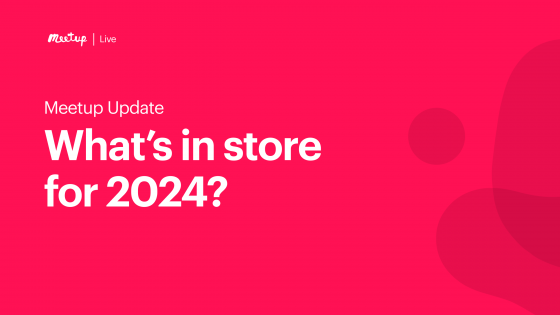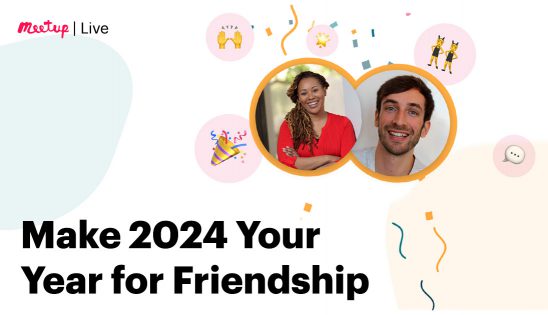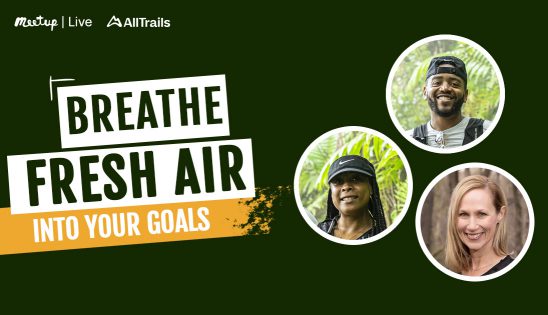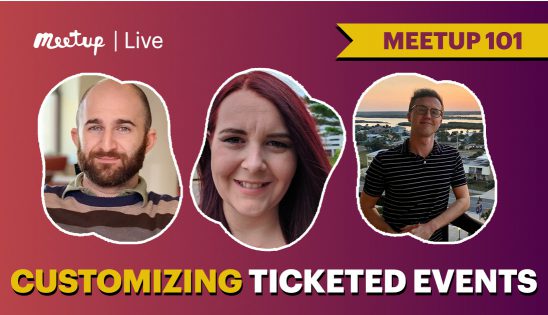October 10 is Mental Health Day, a globally recognized day for discussion and action. To mark the occasion, Meetup Live is hosting a special event on mental wellbeing.
Watch this recording of Natalia Rachel, therapist and author of Why Am I Like This? for a discussion on the role compassion plays in mental health and interpersonal relationships.
Learn how shame is a blocker for mental health and hear steps for overcoming stigma using compassion. Get the lowdown on why strong relationships are essential for our wellbeing. Find out about the most common barriers to mental health and strong social ties and get on the path to healing—together!
Main Takeaways for Mental Health Day
- Meditation (2:20)
- What is compassion? (7:51)
- Compassion is empathy and action, it’s the opposite of judgment and shame. When we tap it we find more ease and grace and peace as we navigate all the challenges and joys of life.
- You mentioned shame and it’s such a common feeling. How do you know when you’re experiencing it? (9:09)
- Shame says I’m bad, I’m wrong, I’m not good enough, I’m not worthy, those are statements many of us feel on a daily basis. If we’re having those thoughts or voices inside our head it’s likely we’re experiencing shame. Also, the “should’ and “shouldn’t” often connect to shame and we try to coerce ourselves to be someone we are not.When we experience shame it’s hard to be our authentic self because we feel not worthy or like we are bad or wrong.
- Shame is a huge barrier to mental health, what do you think are the other major barriers and where does that stigma come from?
- In the world we live in things aren’t what they seem. Most of us are living far beyond our capacity, we are running at full steam and we are experiencing fatigue or anxiety, and we shame ourselves for not being able to be these bright, bubbly superstars all the time. I think a large part is because the structure of the world doesn’t support our vitality. Getting real about this is important.
- What’s a tactful way to inquire about how you can help when it’s someone you don’t know? (25:30)
- “How can I support you right now?” is such a simple and noninvasive question, instead of asking a closed question use open dialogue. You are more likely to start a conversation where you can find even a small way to help, and small ways are really important because they can make a huge difference. Make sure you’re also aware of how much capacity you have for yourself and how much you are able to give to others.
- Why are interpersonal relationships necessary for mental health? (30:21)
- We are born into relationships, we are relational creatures, we do not exist alone and we cannot exist alone. We learn through relationships to do all kinds of things. The need for connection, reflection, and validation doesn’t change, but somewhere along the way as we grow we have forgotten this. As we grow we need belonging and individuality, we need to learn who we are independently, but some of us forget along the way that we also need to belong.
- Sacred Cauldron Poem (41:05)
Q&A
- How do we set boundaries for our shameful feelings?
- The shame feeling often comes as a sense or a voice, I like to develop a voice I call the conscious feeling self, which is a new voice that says no I’m not going to treat myself that way, I’m not going to let shame lead me.
- How would you advise a new retiree who has lost a sense of purpose going from high productivity in their career to a retiring life?
- I think beginning with compassion and normalizing it allows us to step out of shame and into compassion. When we don’t have to work at full steam there are these choices that open up that we haven’t been used to and we need to ask ourselves what would light me up, how can we expend enough energy in a fulfilling way.
- What if you have no one to help you but you feel like you’re near burnout?
- I think that there are often people who can be helpful in small ways, but we have to get creative about tapping into new people and new resources, and they will be different depending on what we need. There are many resources and communities and that’s what Meetup is all about creating groups for health and wellbeing where people can connect and share. I don’t want to invalidate that feeling and sometimes we can’t get access to the specific help that we need, but even a different help is better than no help at all.
Resources
- Natalia Rachel’s book, Why Am I like This?: Illuminating the Traumatized Self
- ‘Setting Boundaries For Empowered Leadership’ online course registration link. Use promo code: leadershiplaunch15 for 15% off
- Human Intelligence Leadership Program Online registration link. Use promo code: meetup15 for 15% off
- Meetup’s Mental Health Resource page
Mary Garcia (she/her) is Meetup’s Content Manager and editor of the Community Matters blog. When she’s not writing, Mary organizes a swamp fiction book club on Meetup. Find her on LinkedIn.
Last modified on November 13, 2023










